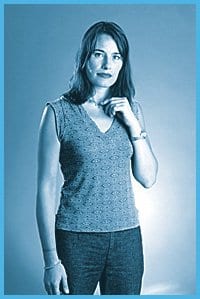Camilla Gibb’s two novels provoke tough questions. Dark questions. Prying questions. About coming out, suicide, anorexia, mental breakdown, sexual abuse, incest, alcoholism and, inevitably, about the echoes between her heroines and Gibb herself.
Gibb’s sensational debut, Mouthing The Words, released in an initial 1,500 print run by local literary publisher Pedlar Press, kicked ass. Indeed, the unlikely best seller – about a sassy survivor of sexual abuse who tells her father she’s not going to “lick your stinking lolly” anymore – was sold into 11 countries, made several 1999 “books of the year” lists, commanded reviews in heavyweights like the New York Times, won the City Of Toronto Book Award and invited comparisons to the smash debut Oranges Are Not The Only Fruit by Brit lit star Jeanette Winterson.
But Gibb’s first novel is better than Winterson’s Oranges. It’s better because it’s funnier, darker, the stakes are higher and the triumph is sweeter. It’s also better because it was necessary. “My God! This is me speaking,” says the heroine Thelma. “I am a mirror. No wonder I do not make people comfortable.”
Truth be told, Gibb is no comfy interview either. She offers no easy answers, even to easy questions. She is leggy, caffeine thin, and has freckles that her publisher’s sexy glam shots glossed out.
Gibb says this about being named to Britain’s Orange Futures list, which labels her a major talent to watch: “I have a very disembodied take on it. It’s all happening across the pond. It’s not in my face. I don’t feel it.”
And this about the publication of her highly touted second novel, The Petty Details Of So-And-So’s Life: “There’s always this fear. You don’t know if you’re a writer yet. You know you’re someone who wrote a first novel.”
How Gibb came to writing is spinning its own neat story. After studying anthropology for 10 years – BA at University Of Toronto, PhD at Oxford – she was contemplating a career in academia when a friend of a friend took note of her obvious misery. Gibb admitted she really wanted to write fiction. The friend asked her what she needed. She said six months and $6,000. The next week, he gave her $6,000 cash, no strings attached. Her younger brother, Alex, offered up his trailer outside Sandbanks Provincial Park.
In what she calls “an initial blast,” Gibb produced Mouthing in 1997. Film director Lynn Fernie, another friend of a friend, recommended it to Beth Follett at Pedlar, who published it in 1999.
A month later, Gibb started Petty, finished it six months later and sold it to Doubleday the next month, in April 2000. “Then there was two years of editing,” says Gibb, who wrote Petty in her Annex apartment, keeping company with a cat named Mouse.
“I do write fast. I write kind of maniacally and wildly for maybe three months. I get superstitious about getting out of my pajamas. I like to feel physical ache from writing. I like starting when it’s dark and finishing when it’s dark and eating in front of my computer. I’m useless to people in my life basically.”
And they would be? Gibb doesn’t like to tread this personal terrain. She admits to sharing certain life facts with her heroines: born in England, moved to Canada as a young child, has a younger brother who’s now an artist, was raised by single mom who remarried, fell in love with a couple of strong women (her ex is singer Lorraine Segato and her current is Alliance Atlantis exec VP Heather Conway) and, presumably, had a difficult father. “We don’t have any contact with him,” she says.
“The parallels in my fiction are probably strong but, ultimately, it’s fiction. I wasn’t sexually abused as a child, but any kind of trauma, any sense of alienation or out of body-ness, there’s some emotional truth – it’s that, that I’m attached to. The beauty of fiction is that it tells our truth more plainly than we actually tell it in real life.”
While Mouthing tells the story of how Thelma wittily survived a father-knows-bullshit childhood, Petty tells the story of how Emma and Blue, sister and brother, survive, well, largely the same. And so we arrive at the tough questions.
Did she write the same novel twice? “The books are really, really different,” Gibb says, surprised. “Clearly there are similar themes, but the primary dynamic is between the brother and sister. It’s about perspective, different perspectives in families.”
And her orientation? Gibb’s characters waffle over that one. “I’ve come out, I’ve gone back in and I’ve come out,” Gibb says, making a noise like a dodge ball losing air. “[Conway] works in a very male dominated industry and she’s very out and she has not been dismissed in anyway, and so she’s given me confidence.”
Suicide, ever contemplated it? And with this question, Gibb finally cracks a smile. “Sure, yeah! What made me want to were probably classic symptoms of depression. You feel absolutely formless and functionless. Somehow you don’t have a presence in the world and that’s incredibly painful. [Doing a PhD,] I was struggling in an academic language. I felt fraudulent. I had to find a native tongue and my native tongue is fiction.
“I have just started to become aware that I am a writer, while writing this second novel. Clearly I have more to say. I hope to be doing this for my whole life. So this is the beginning.”
* Camilla Gibb appears at the Harbourfront Reading Series, with Jill A Davis and Genni Gunn, on Wed, Sep 25 at 7:30pm in the Brigantine Room (235 Queens Quay W). Tix cost $8; call (416) 973-4000.

 Why you can trust Xtra
Why you can trust Xtra


